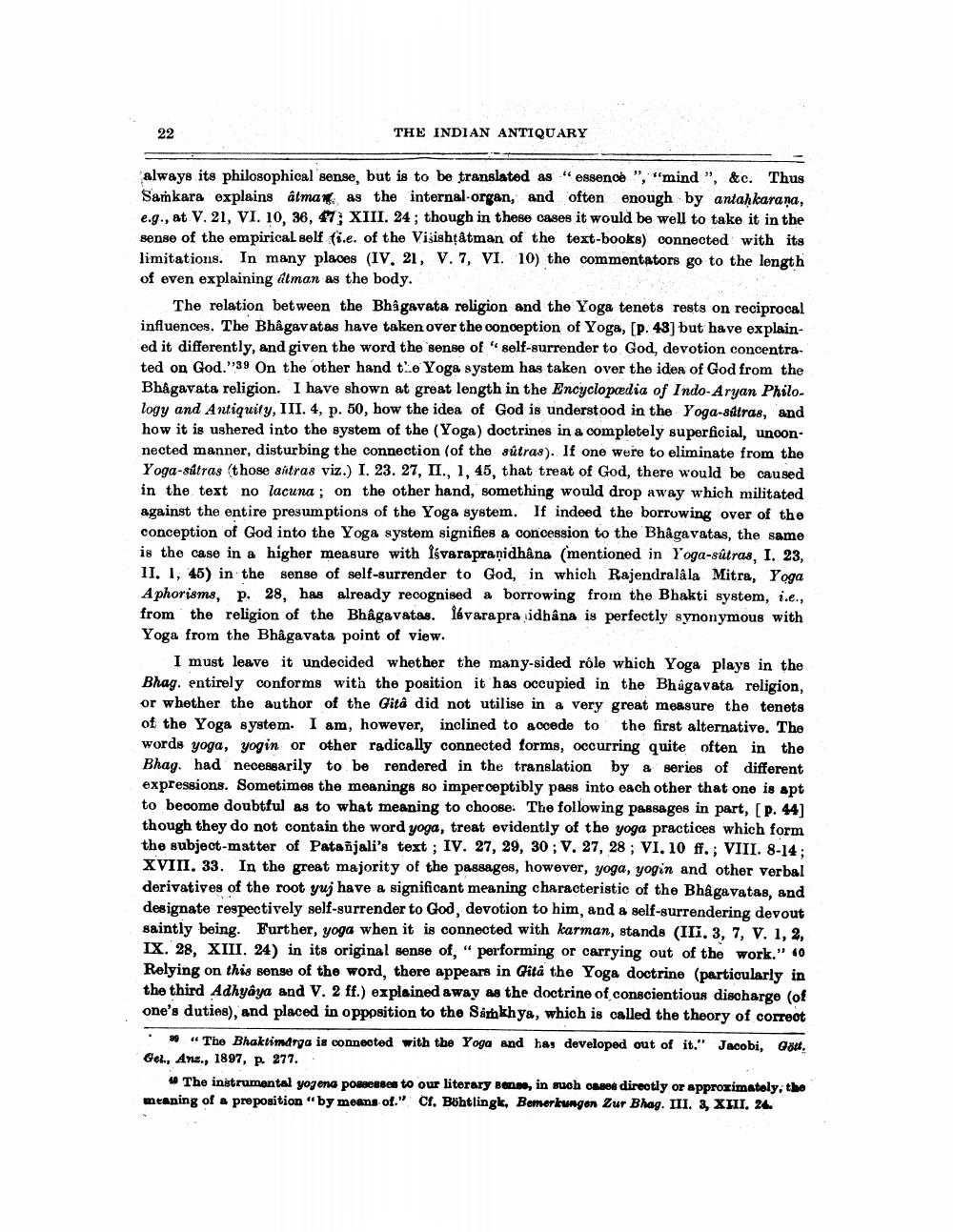________________
22
THE INDIAN ANTIQUARY
always its philosophical sense, but is to be translated as "essence", "mind", &c. Thus Samkara explains atman as the internal-organ, and often enough by antaḥkarana, e.g., at V. 21, VI. 10, 36, 47; XIII. 24; though in these cases it would be well to take it in the sense of the empirical self fi.e. of the Visishțâtman of the text-books) connected with its limitations. In many places (IV. 21, V. 7, VI. 10) the commentators go to the length of even explaining atman as the body.
The relation between the Bhagavata religion and the Yoga tenets rests on reciprocal influences. The Bhagavatas have taken over the conception of Yoga, [p. 43] but have explained it differently, and given the word the sense of "self-surrender to God, devotion concentrated on God."39 On the other hand the Yoga system has taken over the idea of God from the Bhagavata religion. I have shown at great length in the Encyclopædia of Indo-Aryan Philology and Antiquity, III. 4, p. 50, how the idea of God is understood in the Yoga-satras, and how it is ushered into the system of the (Yoga) doctrines in a completely superficial, unoonnected manner, disturbing the connection (of the sûtras). If one were to eliminate from the Yoga-sûtras (those sitras viz.) I. 23. 27, II., 1, 45, that treat of God, there would be caused in the text no lacuna; on the other hand, something would drop away which militated against the entire presumptions of the Yoga system. If indeed the borrowing over of the conception of God into the Yoga system signifies a concession to the Bhagavatas, the same is the case in a higher measure with Isvarapranidhâna (mentioned in Yoga-sûtras, I. 23, II. 1, 45) in the sense of self-surrender to God, in which Rajendralâla Mitra, Yoga Aphorisms, p. 28, has already recognised a borrowing from the Bhakti system, i.e., from the religion of the Bhagavatas. lévarapra idhâna is perfectly synonymous with Yoga from the Bhagavata point of view.
I must leave it undecided whether the many-sided rôle which Yoga plays in the Bhag. entirely conforms with the position it has occupied in the Bhagavata religion, or whether the author of the Gitâ did not utilise in a very great measure the tenets of the Yoga system. I am, however, inclined to accede to the first alternative. The words yoga, yogin or other radically connected forms, occurring quite often in the Bhag. had necessarily to be rendered in the translation by a series of different expressions. Sometimes the meanings so imperceptibly pass into each other that one is apt to become doubtful as to what meaning to choose. The following passages in part, [p. 44] though they do not contain the word yoga, treat evidently of the yoga practices which form the subject-matter of Patanjali's text; IV. 27, 29, 30; V. 27, 28; VI. 10 ff.; VIII. 8-14; XVIII. 33. In the great majority of the passages, however, yoga, yogin and other verbal derivatives of the root yuj have a significant meaning characteristic of the Bhagavatas, and designate respectively self-surrender to God, devotion to him, and a self-surrendering devout saintly being. Further, yoga when it is connected with karman, stands (III. 3, 7, V. 1, 2, IX. 28, XIII. 24) in its original sense of, " performing or carrying out of the work." 40 Relying on this sense of the word, there appears in Gitâ the Yoga doctrine (particularly in the third Adhyaya and V. 2 ff.) explained away as the doctrine of conscientious discharge (of one's duties), and placed in opposition to the Samkhya, which is called the theory of correct
99 "The Bhaktimarga is connected with the Yoga and has developed out of it." Jacobi, Gött. Gel, Anz., 1897, p. 277.
49 The instrumental yogena possesses to our literary sense, in such cases directly or approximately, the meaning of a preposition "by means of." Cf. Böhtlingk, Bemerkungen Zur Bhag. III. 3, XIII. 24.




